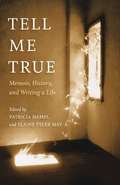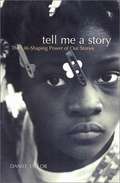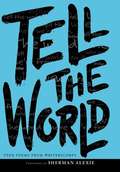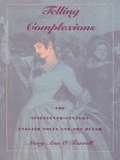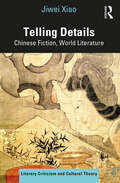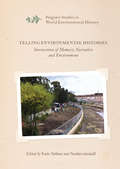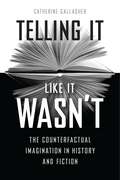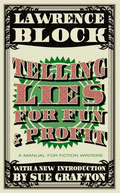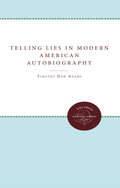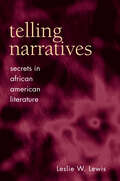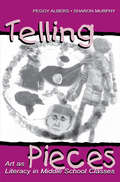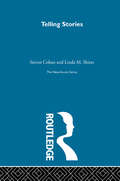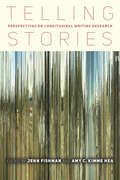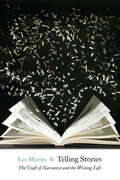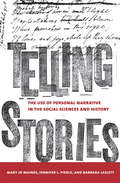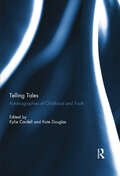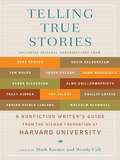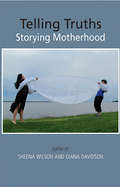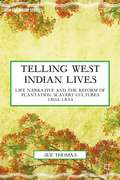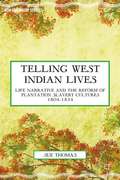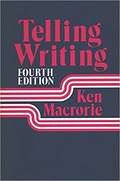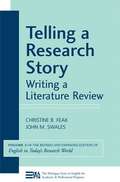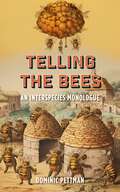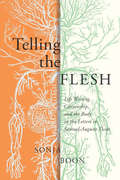- Table View
- List View
Tell Me True: Memoir, History, and Writing a Life
by D. J. Waldie Elaine Tyler May Patricia Hampl"The memoir has been, on the one hand, a startling success story in American publishing in the past quarter century. But it has also been literature's changeling, the bad apple, ever suspect, slightly illegitimate, a brassy parvenu talking too much about itself." - Patricia Hampl, "You're History" Balancing precariously between history and literature, memoir writers have finally found their place on the bookshelf. But increased notoriety brings intense scrutiny: memoirists are expected to create a narrative worthy of fiction while also staying true to the facts. Historians, too, handle tricky issues of writing from "real life," when imagination must fill gaps in the historical record. In this landmark collection, Patricia Hampl and Elaine Tyler May have gathered fourteen original essays from award-winning memoirists and historians. Whether the record emerges from archival sources or from personal memory, these writers show how to make the leap to telling a good story, while also telling us true. Contributors: Andre Aciman, Matt Becker, June Cross, Carlos Eire, Helen Epstein, Samuel G Freedman, Patricia Hampl, Fenton Johnson, Alice Kaplan, Annette Kobak, Michael MacDonald, Elaine Tyler May, Cheri Register, D. J. Waldie Patricia Hampl is the author of three memoirs, including most recently The Florist's Daughter. Elaine Tyler May has written several books on twentieth-century American history. Both are Regents Professors at the University of Minnesota.
Tell Me True: Memoir, History, and Writing a Life
by Elaine Tyler May Patricia HamplMemoir essays on areas such as a Cuban boy brought over to the US without his parents, growing up in the States, knowing you were adopted from overseas, and finding family history despite the European side being killed in WW II, and finding the truth about family history, against the tales you now know are wrong.
Tell Me a Story: The Life-Shaping Power of Our Stories
by Daniel Taylor"You are the product of all the stories you have heard and live - and many that you have never heard. They have shaped how you see yourself, the world, and your place in it... If your present life story is broken or diseased, it can be made well. Or, if necessary, it can be replaced by a story that has a plot worth living." - Back Cover
Tell the World
by WriterscorpsThrough poetry we tell the world who we are, where we're from, what we love, what we think, how we feel, and why we hope. Tell the World is a stunning collection of poems by teens who have taken part in workshops run by WritersCorps, a national alliance of literary arts programs for youth. Their words represent the thoughts, hopes, and dreams of teens everywhere, offering both insight and empathy.
Telling Complexions: The Nineteenth-Century English Novel and the Blush
by Mary Ann O'FarrellIn Telling Complexions Mary Ann O'Farrell explores the frequent use of "the blush" in Victorian novels as a sign of characters' inner emotions and desires. Through lively and textured readings of works by such writers as Jane Austen, Elizabeth Gaskell, Charles Dickens, and Henry James, O'Farrell illuminates literature's relation to the body and the body's place in culture. In the process, she plots a trajectory for the nineteenth-century novel's shift from the practices of manners to the mode of self-consciousness.Although the blush was used to tell the truth of character and body, O'Farrell shows how it is actually undermined as a stable indicator of character in novels such as Pride and Prejudice, Persuasion, North and South, and David Copperfield. She reveals how these writers then moved on in search of other bodily indicators of mortification and desire, among them the swoon, the scar, and the blunder. Providing unique and creative insights into the constructedness of the body and its semiotic play in literature and in culture, Telling Complexions includes parallel examples of the blush in contemporary culture and describes ways that textualized bodies are sometimes imagined to resist the constraints imposed by such construction.
Telling Details: Chinese Fiction, World Literature (Literary Criticism and Cultural Theory)
by Jiwei XiaoWhat is a detail? How is it different from xijie, its Chinese counterpart? Is "reading for the details" fundamentally different from "reading for the plot"? Did xijie xiaoshuo, the Chinese novel of details, give the world its earliest form of modern fiction? Inspired by studies of vision and modernity as well as cinema, this book gazes out on the larger world through the small aperture of the detail, highlighting how concrete literary minutiae become "telling" as they reveal the dynamics of seeing and hearing, the vibrations of the mind, the complexity of the everyday, and the imperative to recognize the minute, the humble, and the hidden. In a strain of masterpieces of xijie xiaoshuo, such details play a key role in pivoting the novel from didacticism towards a capacious modern form. Examining the Chinese detail as both a common idiom and a unique concept, and extrapolating it from individual works to the culture at large, reveals under-explored areas of the Chinese novel: its psychological depths, its connections with other genres and forms, its partaking in Chinese material life and capitalist modernity, as well as repressions and difficulties surrounding its reception in national and international contexts. With carefully chosen case studies, Xiao’s book not only exemplifies the value of deep reading in approaching complex works of Chinese fiction as world literature, it also throws light on the aesthetics and politics of "the unseen," which has become central to a humanist tradition that flows across literature, cinema, and other art forms.
Telling Environmental Histories: Intersections of Memory, Narrative and Environment (Palgrave Studies in World Environmental History)
by Katie Holmes Heather GoodallThis collection explores the intersections of oral history and environmental history. Oral history offers environmental historians the opportunity to understand the ways people's perceptions, experiences and beliefs about environments change over time. In turn, the insights of environmental history challenge oral historians to think more critically about the ways an active, more-than-human world shapes experiences and people. The integration of these approaches enables us to more fully and critically understand the ways cultural and individual memory and experience shapes human interactions with the more-than-human world, just as it enables us to identify the ways human memory, identity and experience is moulded by the landscapes and environments in which people live and labour. It includes contributions from Australia, India, the UK, Canada and the USA.
Telling It Like It Wasn’t: The Counterfactual Imagination in History and Fiction
by Catherine GallagherInventing counterfactual histories is a common pastime of modern day historians, both amateur and professional. We speculate about an America ruled by Jefferson Davis, a Europe that never threw off Hitler, or a second term for JFK. These narratives are often written off as politically inspired fantasy or as pop culture fodder, but in Telling It Like It Wasn’t, Catherine Gallagher takes the history of counterfactual history seriously, pinning it down as an object of dispassionate study. She doesn’t take a moral or normative stand on the practice, but focuses her attention on how it works and to what ends—a quest that takes readers on a fascinating tour of literary and historical criticism. Gallagher locates the origins of contemporary counterfactual history in eighteenth-century Europe, where the idea of other possible historical worlds first took hold in philosophical disputes about Providence before being repurposed by military theorists as a tool for improving the art of war. In the next century, counterfactualism became a legal device for deciding liability, and lengthy alternate-history fictions appeared, illustrating struggles for historical justice. These early motivations—for philosophical understanding, military improvement, and historical justice—are still evident today in our fondness for counterfactual tales. Alternate histories of the Civil War and WWII abound, but here, Gallagher shows how the counterfactual habit of replaying the recent past often shapes our understanding of the actual events themselves. The counterfactual mode lets us continue to envision our future by reconsidering the range of previous alternatives. Throughout this engaging and eye-opening book, Gallagher encourages readers to ask important questions about our obsession with counterfactual history and the roots of our tendency to ask “What if…?”
Telling Lies for Fun & Profit
by Lawrence BlockCharacters refusing to talk? Plot plodding along? Where do good ideas come from anyway? In this wonderfully practical volume, two-time Edgar Award-winning novelist Lawrence Block takes an inside look at writing as a craft and as a career.From studying the market, to mastering self-discipline and "creative procrastination," through coping with rejections, Telling Lies for Fun & Profit is an invaluable sourcebook of information. It is a must read for anyone serious about writing or understanding how the process works.
Telling Lies in Modern American Autobiography
by Timothy Dow AdamsAll autobiographers are unreliable narrators. Yet what a writer chooses to misrepresent is as telling -- perhaps even more so -- as what really happened. Timothy Adams believes that autobiography is an attempt to reconcile one's life with one's self, and he argues in this book that autobiography should not be taken as historically accurate but as metaphorically authentic.Adams focuses on five modern American writers whose autobiographies are particularly complex because of apparent lies that permeate them. In examining their stories, Adams shows that lying in autobiography, especially literary autobiography, is not simply inevitable. Rather it is often a deliberate, highly strategic decision on the author's part.Throughout his analysis, Adams's standard is not literal accuracy but personal authenticity. He attempts to resolve some of the paradoxes of recent autobiographical theory by looking at the classic question of design and truth in autobiography from the underside -- with a focus on lying rather than truth.Originally published in 1990.A UNC Press Enduring Edition -- UNC Press Enduring Editions use the latest in digital technology to make available again books from our distinguished backlist that were previously out of print. These editions are published unaltered from the original, and are presented in affordable paperback formats, bringing readers both historical and cultural value.
Telling Narratives: Secrets in African American Literature
by Leslie W. LewisTelling Narratives analyzes key texts from nineteenth- and early twentieth-century African American literature to demonstrate how secrets and their many tellings have become slavery's legacy. By focusing on the ways secrets are told in texts by Jessie Fauset, Charles W. Chesnutt, Pauline Hopkins, Frederick Douglass, and others, Leslie W. Lewis suggests an alternative model to the feminist dichotomy of "breaking silence" in response to sexual violence. This fascinating study also suggests that masculine bias problematically ignores female experience in order to equate slavery with social death. In calling attention to the sexual behavior of slave masters in African American literature, Lewis highlights its importance to slavery’s legacy and offers a new understanding of the origins of self-consciousness within African American experience.
Telling Pieces: Art As Literacy in Middle School Classes
by Sharon Murphy Peggy AlbersTelling Pieces is an exploration of how pre-adolescent middle-school children develop a knowledge and understanding of the conventions of art (art as literacy) and how they use this knowledge to create representations of their lives in a small midwestern U.S. town. Beginning with an overview of social semiotics and emergent literacy theorizing, the authors set the stage for their study of sixth graders involved in art. A galleria of children's artworks is presented, allowing readers/viewers to consider these texts independent of the authors' interpretations of them. Then, set against the galleria is the story of the community and school contexts in which the artworks are produced--contexts in which racism, homophobia, and the repression of creativity are often the norm. The interpretation the authors bring to bear on the artworks reveals stories that the artworks may or may not tell on their own. But the tales of artistic literacy achievement are counterbalanced by reflection about the content of the artworks produced, because the artworks reveal the impossibility for students to imagine beyond the situational bounds of racism, homophobia, and religiosity. The authors conclude by raising questions about the kinds of conditions that make literacy in art possible. In doing so, they explore selected alternative models and, in addition, ask readers to consider the implications of the ideological issues underlying teaching children how to represent their ideas. They also advocate for a participatory pedagogy of possibility founded on ethical relational principles in the creation and interpretation of visual text. Of particular interest to school professionals, researchers, and graduate students in literacy or art education, this pioneering book: * brings together the fields of art education and literacy education through its focus on how middle school students come to work with and understand the semiotic systems, * introduces sociolinguistic, sociological, and postmodernist perspectives to thinking about children's work with art--adding a new dimension to the psychological and developmental descriptions that have tended to dominate thinking in the field, * includes a galleria of 40 examples of children's artwork, providing a unique opportunity for readers/viewers to interpret and consider the artwork of the sixth graders independent of the authors' interpretations, * presents descriptions of art teaching in process, * gives considerable attention to the interpretation of the children's artworks and the influences that contribute to the content they represent, and * considers varying models of art education along with the implications of introducing new representational possibilities.
Telling Stories: A Theoretical Analysis Of Narrative Fiction (New Accents Ser.)
by Steven Cohan Linda M. ShiresFirst Published in 2002. Routledge is an imprint of Taylor & Francis, an informa company.
Telling Stories: Perspectives on Longitudinal Writing Research
by Jenn Fishman Amy Kimme HeaIn Telling Stories, more than a dozen longitudinal writing researchers look beyond conventional project findings to story their work and, in doing so, offer otherwise unavailable glimpses into the logics and logistics of long-range studies of writing. The result is a volume that centers interrelations among people, places, and politics across two decades of praxis and an array of educational sites: two-year colleges, a senior military college, an adult literacy center, a small liberal arts college, and both public and private four-year universities. Contributors share direct knowledge of longitudinal writing research, citing project data (e.g., interview transcripts, research notes, and journals), descriptions drawn from memory, and extended personal reflections. The resulting stories, tempered by the research and scholarship of others, convey a sense of longitudinal research as a lived activity as well as a prominent and consequential approach to inquiry. Yet Telling Stories is not a how-to guide, nor is it written for longitudinal researchers alone. Instead, this volume addresses issues about writing research that are germane to all who conduct or count on it. Such topics include building and sustaining good interpersonal research relations, ethically negotiating the institutional power dynamics that undergird writing research, effectively using knowledge from longitudinal studies to advocate for writers and writing educators, and improving both conceptual and concrete resources for long-range research in writing studies.
Telling Stories: The Craft of Narrative and the Writing Life
by Lee MartinA prolific and award-winning writer, Lee Martin has put pen to paper to offer his wisdom, honed during thirty years of teaching the oh-so-elusive art of writing. Telling Stories is intended for anyone interested in thinking more about the elements of storytelling in short stories, novels, and memoirs. Martin clearly delineates helpful and practical techniques for demystifying the writing process and provides tools for perfecting the art of the scene, characterization, detail, point of view, language, and revision—in short, the art of writing. His discussion of the craft in his own life draws from experiences, memories, and stories to provide a more personal perspective on the elements of writing. Martin provides encouragement by sharing what he’s learned from his journey through frustrations, challenges, and successes. Most important, Telling Stories emphasizes that you are not alone on this journey and that writers must remain focused on what they love: the process of moving words on the page. By focusing on that purpose, Martin contends, the journey will always take you where you’re meant to go.
Telling Stories: The Use of Personal Narratives in the Social Sciences and History
by Mary Jo MaynesMary Jo Maynes, Jennifer L. Pierce, and Barbara Laslett argue that personal narratives--autobiographies, oral histories, life history interviews, and memoirs--are an important research tool for understanding the relationship between people and their societies. Gathering examples from throughout the world and from premodern as well as contemporary cultures, they draw from labor history and class analysis, feminist sociology, race relations, and anthropology to demonstrate the value of personal narratives for scholars and students alike. Telling Stories explores why and how personal narratives should be used as evidence, and the methods and pitfalls of their use. The authors stress the importance of recognizing that stories that people tell about their lives are never simply individual. Rather, they are told in historically specific times and settings and call on rules, models, and social experiences that govern how story elements link together in the process of self-narration. Stories show how individuals' motivations, emotions, and imaginations have been shaped by their cumulative life experiences. In turn, Telling Stories demonstrates how the knowledge produced by personal narrative analysis is not simply contained in the stories told; the understanding that takes place between narrator and analyst and between analyst and audience enriches the results immeasurably.
Telling Tales: Autobiographies Of Childhood And Youth
by Kate Douglas Kylie CardellYoung writers have historically played a pivotal role in shaping autobiographical genres and this continues into the graphic and digital texts which characterise contemporary life writing. This volume offers a selection of pertinent case studies which illuminate some of the core themes which have come to characterise autobiographical writings of childhood, including: cultural and identity representations and tensions, coming into knowledge and education, sexuality, prejudice, war, and trauma. The book also reveals preoccupations with the cultural forms of autobiographical writings of childhood and youth take, engaging in discussions of archives, graphic texts, digital forms, testimony, didacticism in autobiography and the anthologising of life writing. This collection will open up broader conversations about the scope of life writing about childhood and youth and the importance of life writing genres in prompting dialogues about literary cultures and coming of age. This book was originally published as a special issue of Prose Studies.
Telling True Stories: A Nonfiction Writers' Guide from the Nieman Foundation at Harvard University
by Mark Kramer Wendy CallInspiring stories and practical advice from America's most respected journalists The country's most prominent journalists and nonfiction authors gather each year at Harvard's Nieman Conference on Narrative Journalism. <P><P>Telling True Stories presents their best advice--covering everything from finding a good topic, to structuring narrative stories, to writing and selling your first book. More than fifty well-known writers offer their most powerful tips, including: * Tom Wolfe on the emotional core of the story * Gay Talese on writing about private lives * Malcolm Gladwell on the limits of profiles * Nora Ephron on narrative writing and screenwriters * Alma Guillermoprieto on telling the story and telling the truth * Dozens of Pulitzer Prize-winning journalists from the Atlantic Monthly, New Yorker, New York Times, Los Angeles Times, Washington Post and more . . . The essays contain important counsel for new and career journalists, as well as for freelance writers, radio producers, and memoirists. Packed with refreshingly candid and insightful recommendations, Telling True Stories will show anyone fascinated by the art of writing nonfiction how to bring people, scenes, and ideas to life on the page.
Telling Truths: Storying Motherhood
by Sheena WilsonTelling Truths: Storying Motherhood is a collection of creative non-fiction essays. Through story, contributing authors explore how expectations collide with the complex realities we face as we mother. They illustrate how mothering is inextricably linked to the positions we occupy within our specific socio-cultural contexts; how our versions of mothering are transformed in relationship to the children we raise, long for, and mourn. Together, as writers and readers, as mothers and parents and communities, we are rewriting and rereading and reinventing what it means to mother and parent our children at this moment in history. This anthology is an important contribution to ongoing dialogues that resist traditional expectations around motherhood.
Telling West Indian Lives: Life Narrative and the Reform of Plantation Slavery Cultures 1804–1834 (New Caribbean Studies)
by S. ThomasTelling West Indian Lives: Life Narrative and the Reform of Plantation Slavery Cultures 1804-1834 draws historical and literary attention to life story and narration in the late plantation slavery period. Drawing on new archival research, it highlights the ways written narrative shaped evangelical, philanthropic, and antislavery reform projects.
Telling West Indian Lives: Life Narrative and the Reform of Plantation Slavery Cultures, 1804-1834 (New Caribbean Studies)
by Sue ThomasTelling West Indian Lives: Life Narrative and the Reform of Plantation Slavery Cultures 1804-1834 draws historical and literary attention to life story and narration in the late plantation slavery period. Drawing on new archival research, it highlights the ways written narrative shaped evangelical, philanthropic, and antislavery reform projects.
Telling Writing
by Ken MacrorieWhy is Telling Writing, now in its fourth edition, still going strong in hundreds of colleges and universities? Ken Macrorie touches on the answer in his preface: "Good teaching in any field isn't a matter of employing gimmicks and choosing from a damnfool encyclopedia of tricks to play on students . . . but a matter of setting up a climate friendly to learning and then challenging learners to connect their experience and ideas with those of the accepted authorities or producers. Students can't become truly educated unless they grow out of and beyond themselves . . . Telling Writing gives them an indispensable base, a knowledge of themselves on which to grow." <p><p> Macrorie's approach works because it helps students break away from the deadly academic prose fostered by so many writing courses and enables them to write about and from their own experiences.
Telling a Research Story: Writing a Literature Review [Volume 2 of the Revised and Expanded Edition of English in Today's Research World)
by John M. Swales Christine FeakThis volume progresses from general to specific issues in the writing of literature reviews. It opens with some orientations that raise awareness of the issues that surround the telling of a research story. Issues of structure and matters of language, style, and rhetoric are then discussed.
Telling the Bees: An Interspecies Monologue
by Dominic PettmanIn a bid to wean himself off Facebook and Twitter, media scholar and cultural theorist Dominic Pettman decided to revive an ancient custom. He decided to tell the local bees of his thoughts, theories, musings, and meditations. The result was an apian journal that parses the daily news and the routines of modern life in a more sustained and reflective way than the Pavlovian posts to which we are so addicted.The account that emerges from Pettman’s regular discussion with the bees forms a compelling portrait of the tumultuous period running from the Fall of 2019 to New Year’s Eve, 2022. What began as a reflection on the traumatic effects of an “unprecedented” presidency soon evolved into a real-time response to the equally extraordinary events of the pandemic and its aftermath. One key concern that emerges from Pettman’s ongoing discussion with the bees is the extent to which, thanks to the alienating effects of neoliberalism, we were already engaged in an advanced form of social distancing long before anyone had heard of COVID. Other key themes include education, human-animal relations, climate change, mediated intimacy, attention ecologies, collective memory, slow violence, the self-fulfilling prophecy that is New York City, the never-ending end of history, and the mundane strategies we share in a bid to forge on, despite the accumulating challenges of the twenty-first century. Telling the Bees is an invitation to rediscover the art of reflection and a profound meditation on human connection, alienation, and our collective yearning for intimacy in an age of distance. Through what Pettman describes as an "interspecies monologue," readers are treated to a unique perspective on navigating the complexities of the twenty-first century, inspired by the ingenuity and resilience of our natural cohabitants.
Telling the Flesh: Life Writing, Citizenship, and the Body in the Letters to Samuel Auguste Tissot
by Sonja BoonIn the second half of the eighteenth century, celebrated Swiss physician Samuel Auguste Tissot (1728-1797) received over 1,200 medical consultation letters from across Europe and beyond. <P><P>Written by individuals seeking respite from a range of ailments, these letters offer valuable insight into the nature of physical suffering. Plaintive, desperate, querulous, fearful, frustrated, and sometimes arrogant and self-interested in tone, the letters to Tissot not only express the struggle of individuals to understand the body and its workings, but also reveal the close connections between embodiment and politics. Through the process of writing letters to describe their ailments, the correspondents created textual versions of themselves, articulating identities shaped by their physical experiences. Using these identities and experiences as examples, Sonja Boon argues that the complaints voiced in the letters were intimately linked to broader social and political discourses of citizenship in the late eighteenth century, a period beset with concerns about depopulation, moral depravity, and corporeal excess, and organized around intricate rules of propriety. Contributing to the fields of literary criticism, history, gender and sexuality studies, and history of medicine, Telling the Flesh establishes a compelling argument about the connections between health, politics, and identity.
